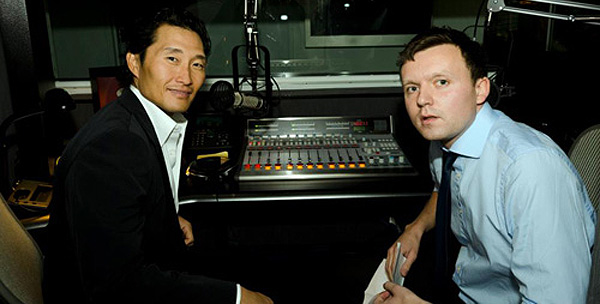The Peninsula
5 Questions with Daniel Dae Kim

At Korean American Day on January 13, the Korea Economic Institute had the opportunity of catching up with legendary actor Daniel Dae Kim for a conversation about his career, interests, and life as a Korean-American.
The conversation was originally recorded as a podcast (which you can download from our Korean Kontext podcast page) , but we now provide five of the best questions for our blog readers:
1.What was it that made you change your career path from law to acting during your university days?
DDK: For me, when I was going through college, there was a lot of tension between what I felt I should do and what I really wanted to do. It was unfortunate that the thing I wanted to do didn’t fall in line with what was expected of me. As much as I do love politics and government, the thing that I felt that my heart led me to was acting, and so that’s why I changed course.
2. Ronald Reagan once said, “How can a president not be an actor?” What do you think of Obama in terms of acting?
DDK: I think there is a great value to being an orator, a really good orator. I think President Obama is exceptionally good at speechmaking. I think he has a way of connecting to his audience without sounding like he is feeding you B.S., and that is a very important part of the job. When you have someone who is not as strong in that department, I’ve got to admit, I trust that person less or I feel less sure of his capabilities. That is definitely part of it. I think Ronald Reagan was onto something with that statement.
3. As a Korean-American, have you ever had any difficulty balancing your identity between Korea and America?
DDK: I think it is fluid. Throughout my life, there were stages at which I felt, or wished, I was more “American,” even though as Korean-American I am fully American. There were other times when I fully embraced my Korean heritage. It is a question to which the answer is ever evolving for me, but I am happy to say that I feel like I’ve found a nice balance. The older I get and the more sure of who I am I get, the easier it gets.
But there have been moments where I have felt like I am a person without a country – I am not 100% accepted in America, I am not 100% accepted in Korea – those are the down days. However, usually I really feel lucky to have two cultures in my daily experience. To be able to say that I understand something specific about America that maybe a typical “American” wouldn’t is, I think, a real blessing. I have a perspective on Korea now, as an American, which I think is unique. So, more of the time, I feel like I am privy to two societies as opposed to master of none.
4. What are some examples of the work that you do in areas outside of acting that perhaps your average American might not be familiar with, and of that, what are you most proud of?
DDK: That’s a really good question. I’m involved with various charitable organizations, in Hawaii and nationally, and I’m proud of the work I do with them. More recently I’m proud of, gosh, if I can even say proud…I really think, more, the appropriate way of putting it is I am honored to be a spokesperson for organizations like KEI or KACF. I think they are really a large part of what I can offer back to the community – not just the Korean community, but the American community in general. I’m hopeful that I am able to do more of that.
5. Do you think it is important for celebrities to be involved in politics? With your education and experience as an actor, is it important and useful to express your opinion to fans?
DDK: I think that’s a great question because it is one that I am asking myself a lot these days. It’s a fine line, isn’t it? You’re in a position, as an actor, to be able to speak to thousands of people, so why shouldn’t you voice your opinion as a citizen? At the same time, the pitfalls and traps are that you become “just another dilettante actor” who has an opinion about something but is out of touch with the world – that’s the cliché, isn’t it? So, you know, I walk that tightrope, and I do have very strong political convictions but I very rarely voice them on Twitter because I feel like that’s not necessarily why people follow me. If they wanted to get political advice, they would follow the pundits who are out there, and they are a dime a dozen. At the same time, if I do feel strongly about something, it’s part of who I am, as a human being, as a citizen of America. So, I think that it does have a place for everyone. If the average person had a Twitter account, they could talk about it, so why should I be limited by what I do?
— To listen to the full podcast and find out about other episodes, make sure you visit the Korean Kontext Podbean page. —
